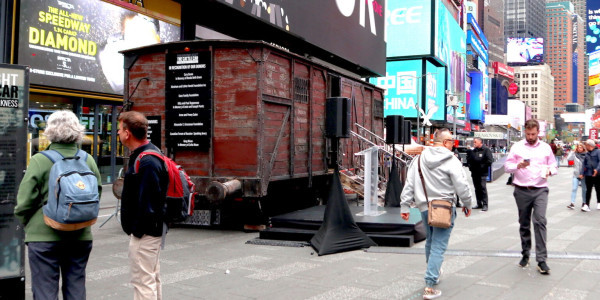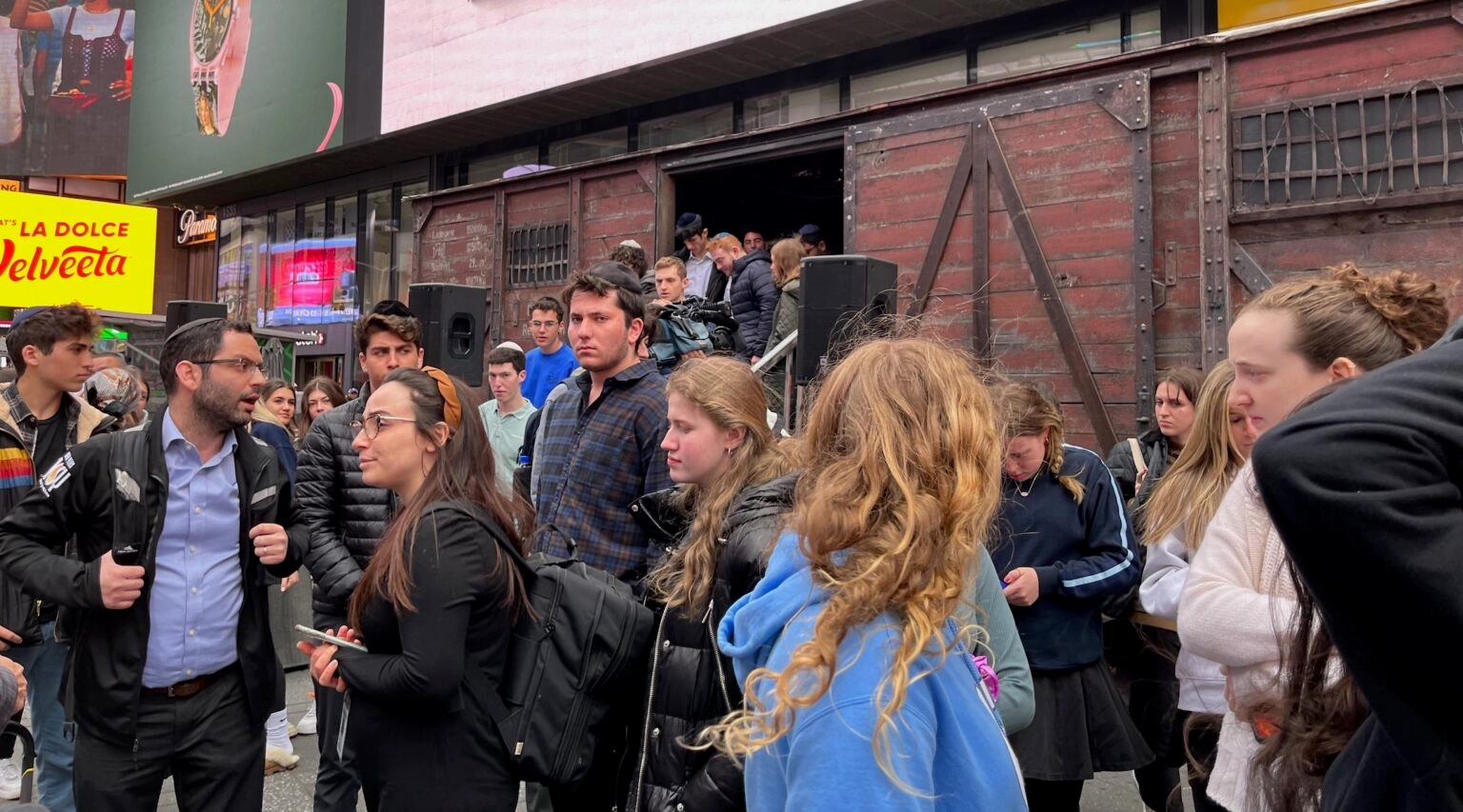A Holocaust cattle car in Times Square makes a moving, if jarring, statement
18/04/2023 | Na stronie od 20/04/2023

A replica of a Holocaust cattle car is on view in Times Square in honor of Yom Hashoah, April 18, 2023. (Julian Voloj)
Source:New York Jewish Week
By Julia Gergely April 18, 2023
(New York Jewish Week) — Times Square may be best known for its flashy billboards, roving bands of knock-off Elmos and hordes of gawking tourists. But on Tuesday, Holocaust Remembrance Day, visitors to the “crossroads of the world” could also see a replica of the kind of cattle car that transported millions of Jews to their deaths in Nazi-run concentration camps.
The cattle car was parked at the intersection of 46th and Broadway, across from a Forever 21 and the TKTS Ticket window, where curious visitors could step inside and see a film, projected on its four walls, detailing the horrors of the Holocaust.
The “Cattle Car: Stepping In and Out of Darkness” exhibit was developed in 2020 by ShadowLight, a Toronto-based Holocaust education nonprofit, and Southern NCSY, the Florida branch of the Orthodox Union youth group. NCSY’s “Hate Ends Now” tour is traveling the country with a mission to promote Holocaust education and combat antisemitism.
“This exhibit is one of the country’s most innovative Holocaust education tools, and today we’ve brought it to the crossroads of the world,” said Todd Cohn, executive director of Southern NCSY. “If you want to make the world aware of a cause, this is the place to do it.”
On Tuesday morning, while lots of people walked by without looking up, as many in New York are wont to do, several stopped in their tracks to take a look around, snap some pictures and scan the QR code to learn more about the cattle car and the Holocaust. Others took selfies and one asked if the exhibit was a celebration of Passover, which Cohn took as an opportunity to teach about Judaism and the memory of the Holocaust.
“This is amazing to see,” said Yael Shimoni-Degani, an Israeli tourist who was walking through Times Square while visiting her daughter who lives in New York City. The pair was waiting to go inside. “It’s very important to remind people what happened,” Shimoni-Degani said.
The cattle car will be parked in Times Square until 9:00 p.m. on Tuesday, or Yom Hashoah, which is marked as Holocaust Remembrance Day by Israel and Jews worldwide. Rotating groups from area Jewish high schools were invited to visit throughout the day. An event scheduled for 7:00 p.m., open to the public, was to feature Holocaust survivors, U.S. Army veterans who were involved in liberating the camps, Israeli emissaries and local politicians. The crowd will be invited to sing prayers and light yahrzeit candles in memory of victims of the Holocaust.
 A group of students from The Ramaz School exits the “Cattle Car: Stepping In and Out of Darkness” exhibit in Times Square, April 18, 2023. (Julia Gergely)
A group of students from The Ramaz School exits the “Cattle Car: Stepping In and Out of Darkness” exhibit in Times Square, April 18, 2023. (Julia Gergely)
Attendees are closed inside the cattle car — an effort to make tangible the experience of victims and survivors. The 20-minute video provides a timeline of the Holocaust and and includes testimonies from survivors Hedy Bohm and Nate Leipciger. The video concludes by urging viewers to take responsibility for their actions, asking questions like, “How did the world let this happen?” and “How can you raise your voice?” Statistics on rising antisemitism, racism and violence against LGBTQ communities are displayed.
“While inspiring the Jewish future is our core mission, the general public is just as much our intended audience today,” Cohn said, noting the “universal message” of the exhibit. One of the goals of “Hate Ends Now,” which has toured the Florida state capitol and will move onto college campuses in Boston next week, is to “make sure hate doesn’t go unchecked,” Cohn said, especially in a time of rising antisemitism.
There was a large security and police presence nearby, and an officer inside the exhibit.
Dini Hass, an educator at the Ramaz School who had brought a group of students to tour the exhibit, told the New York Jewish Week that visiting the cattle car was an incredible experience and an opportunity to share her family’s story as the granddaughter of four Holocaust survivors. “To have this in the middle of Times Square is one of the craziest things I’ve ever seen,” she said, admiringly.
Writer Dara Horn, however, was skeptical that exhibits like this — especially those mounted in such a public space like Times Square — actually have the power to turn the tide of antisemitism, despite their well-meaning intentions.
“I came to the disturbing conclusion that Holocaust education is incapable of addressing contemporary antisemitism,” said Horn, who recently toured the country taking stock of different Holocaust education initiatives. “There’s a bunch of reasons for that. One is that it’s been used as this case study outside of history and it’s used for public moral education. I can’t think of any other event in history where we isolate it from any kind of context and it’s become an atrocity that we are required to universalize.”
Horn noted that her comments were not specific to the “Hate Ends Now” exhibit, rather to the broader effort of Holocaust education and combating antisemitism among the general, non-Jewish public. She also conceded that, for Jewish communities, Yom Hashoah and Holocaust education exhibits are important in that they offer a moment to mourn and honor the dead.
And yet, she said, “This becomes the one thing people know about Jews — that they were murdered in the Holocaust — and now it is there to teach us something about humanity,” she added. “There’s a huge problem where the general public is taught about the Holocaust, and knows absolutely nothing about Jews who are alive today, or about the lives and contents of Jewish civilization in Europe that was lost.”
As someone who is well-informed about the Holocaust, educator Dini Hass said that she is often shocked by how little both Jews and non-Jews know about the Holocaust. “If something like this makes even one person stop for a second to think about the Holocaust and want to learn about it, then it’s doing its job,” she said.